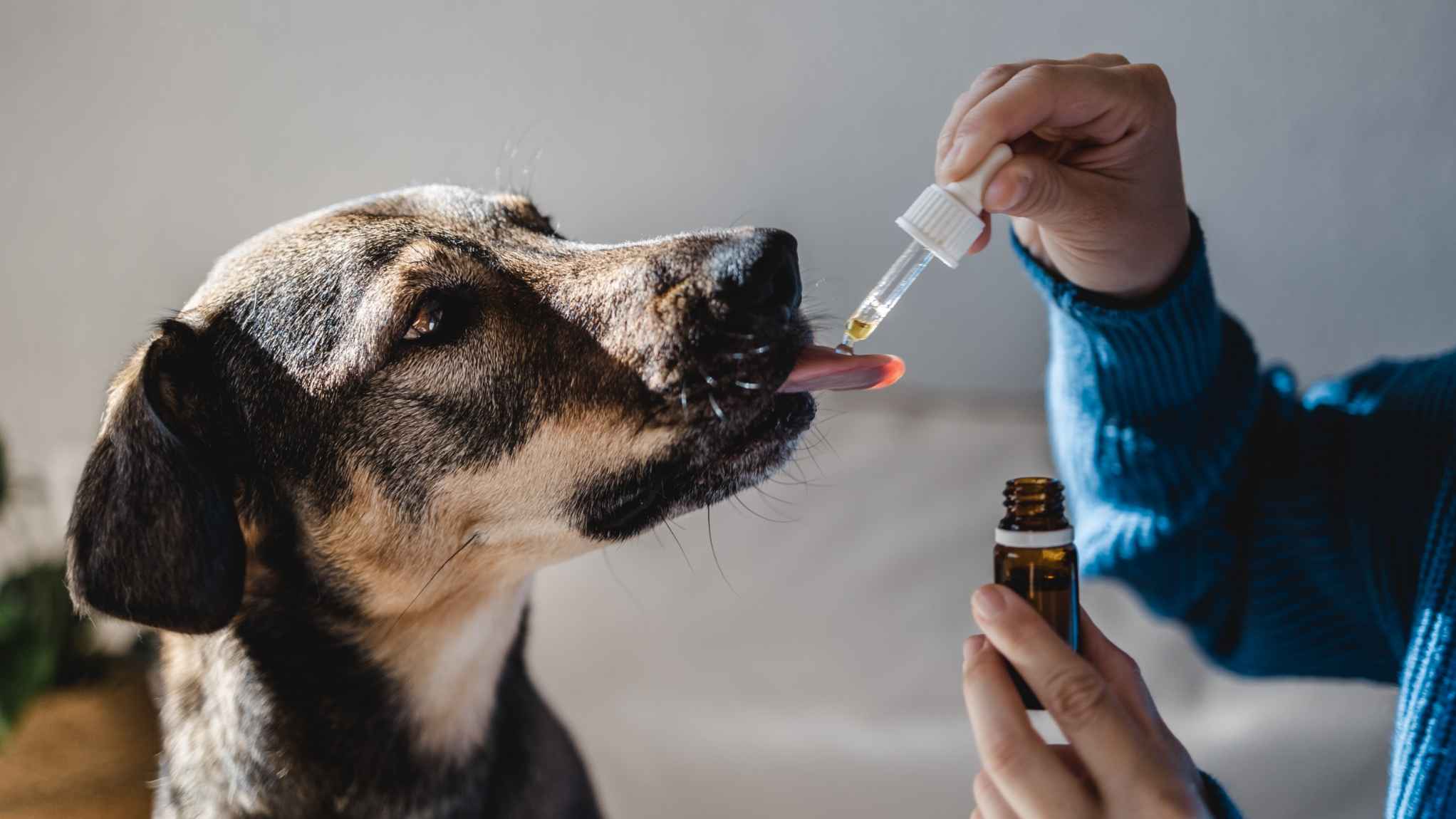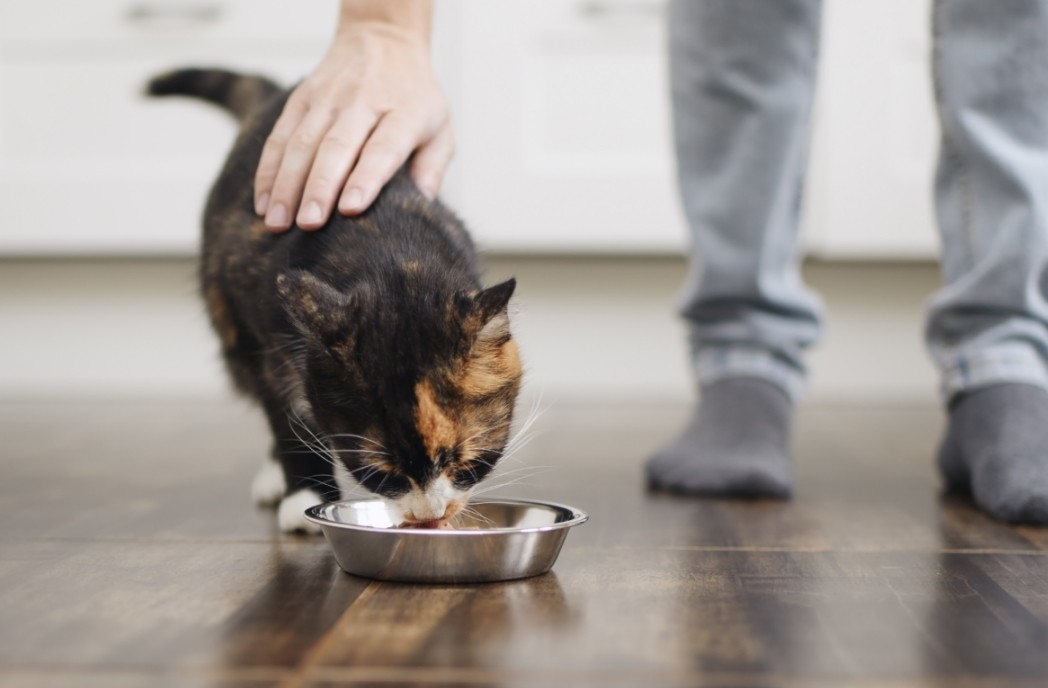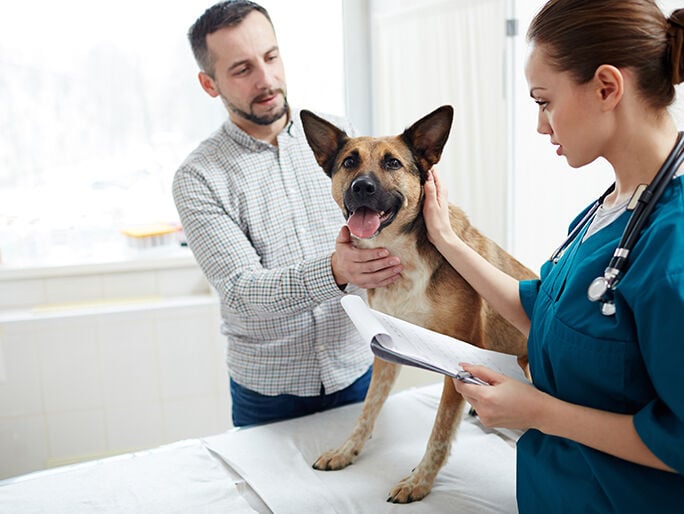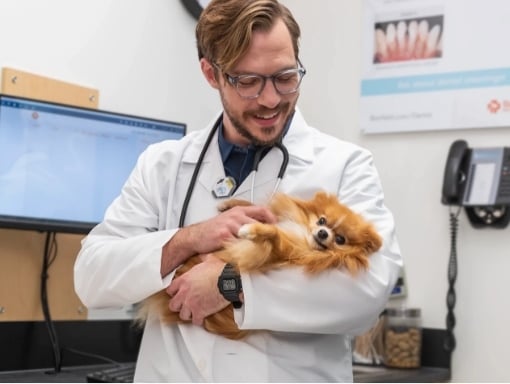treating pet skin and coat problems
Sometimes dog or cat skin and coat issues are more than skin deep.
Sometimes skin symptoms aren’t just about skin. They can be a sign of infections, dietary imbalances, allergies, hormonal imbalances, and many other concerns.

Common reasons pets need skin treatments
- Bites or wounds
- Parasites like fleas, ticks, mites, and mange
- Bacterial or fungal infections
- Food or environmental allergies
- Nutritional or hormonal imbalances
- Stress
- Immune diseases
- Ear infections or anal sac issues
- Gastrointestinal problems

Common veterinary treatment for skin and coat concerns
- Oral medications
- Topical ointments
- Parasite prevention
- Diet changes
- Special shampoos
How to help treat skin and coat issues in dogs and cats
Many different issues can cause skin and coat issues. Your veterinarian may prescribe a few different kinds of treatments to help your pet.
Does my pet need medication for their skin problem?
Prescription medications for pets are provided by your veterinary team to help you treat your pet at home. Some of these medications can be filled at a pharmacy where people have their prescriptions filled; others may need to be ordered or custom compounded for your pet. It’s very important to follow the directions from your vet and on the medication to help your pet.
Does your pet hate pills? Some newer medications are delivered via a long-acting injection. Ask your veterinarian if these options are available and appropriate for your pet.
Oral medications for pets
Oral medications are designed to be fed to your pet. For skin issues, these oral meds include antibiotics to fight bacterial infections, antihistamines, allergy medications, anti-itch treatments, and steroids to help reduce itching and inflammation.
Is getting your cat or dog to take their medicine a challenge? Let your veterinary team know. They may be able to provide tips and tricks to help you help your pet.
Topical medications and medicated shampoos for dogs and cats
Topical medications are used on top of the skin (not eaten). Depending on your pet’s skin or coat issue, they can include special soaps or shampoos, ointments, creams, sprays, and lotions.
Topical meds often must be prescribed and provided by a veterinarian. Different topical medications may need to be applied differently — shampoos may need to be washed off after a set period of time, other forms need to be applied and allowed to dry — so be sure to read the product information and ask your veterinary team if you have questions.
It isn’t unusual for a pet to need both oral and topical treatments at the same time. Since any break in the skin can lead to infection, your BFF could have one main issue (like allergies), but also secondary issues (like infections) due to broken skin or a weakened immune system.
Year-round parasite prevention is a great way to help your pet
Parasite prevention is typically given to your pet on a regular and ongoing basis to help them avoid fleas, ticks, mites, and other nasties. There are many different forms of safe and effective prescription parasite prevention, including edible chews for dogs and topical treatments for cats. Ask your veterinary team what version they recommend for your pet’s preferences, location, and lifestyle.
Protecting your pet against parasites has multiple benefits. Some options can prevent deadly diseases, like heartworm, while helping to protect against other bugs as well as flea, tick, and mite bites. This in turn can cut down on constant scratching, which can damage skin and lead to infection.
Another plus? Year-round parasite control helps to stop the spread of parasites to people, environments, and other pets.
Vet-recommended diets and supplements for specific issues
Some skin and coat issues can be helped by changing or supplementing your pet’s diet, especially if your veterinary team suspects a food allergy. Ask your veterinary team about pet-friendly formulations that contain omega-6 and omega-3, or if a special diet with limited ingredients can help reduce your pet’s inflammation and itchiness.
Mentioned in this article





Need advice on flea control? Ping Pet Chat™!
Whether it's 3 a.m. or 3 p.m., connect with a real veterinary professional for immediate petcare advice. It's included in all Optimum Wellness Plans®!
Log in to start chatting
Save at the Banfield Shop
Our mission is to provide high-quality prescription meds for the pet you love. We believe in safe, effective petcare, so we thoroughly assess every item we carry. We offer discounts on eligible products with your pet’s Optimum Wellness Plan. And you can easily schedule deliveries with our super convenient AutoShip program.
How Banfield can help with pet skin and coat care
We’re here to help your pet’s skin and coat be happy and healthy. From external parasites to skin problems to skin allergies and bumps or wounds, our vets can help with informed diagnoses and action plans to help your pet.

Get veterinary care for external parasites like fleas, ticks, and mites. From flea infestations to tick bites to ear mites and more, our vets can check out skin and coat cooties and recommend appropriate treatment. We’re happy to walk you through your options for year-round parasite control to help your pet!
Is your pet always itchy? Do you think your pet has a skin allergy? Causes for cat or dog itching and scratching can go more than skin deep. We can help figure out what’s causing your pet’s discomfort and suggest medications and treatments that can help your pet be more comfortable in their own skin.
See us for help with bald spots, shedding, greasy skin, and dandruff. Many pet health issues can affect your pet’s beautiful skin and coat. Whether it’s a flea allergy, dermatitis, seborrhea, allergies, anxiety-based issues, or other health concerns, our vets here to help with diagnosis and treatment.
Does your best furry friend have a cut or wound? Do you think they may have a tumor? Give us a call! Our vets can evaluate strange lumps and bumps and let you know if you can stop worrying. We can also help with wounds or direct you to the best resource to immediately help your pet.
 Mites and mange
Mites and mange Podcast - Not Just Fluff
Podcast - Not Just Fluff



